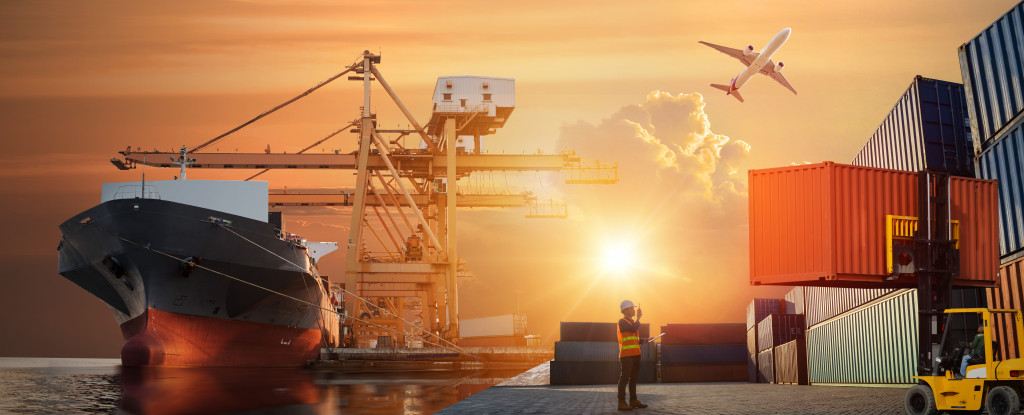Inclement weather can cause major problems for supply chain and logistics operations. Whether it’s snow, fog, heavy rain, or high winds, bad weather can slow down shipments and cause costly delays. Fortunately, numerous innovative solutions are available to help keep your logistics operations running smoothly despite the threat of inclement weather. Here’s a look at some of them.
Automation and AI-Driven Solutions
Automation and AI-driven solutions are becoming increasingly popular in the logistics industry as an effective means of mitigating weather-related risks. Automated systems can be used to monitor real-time conditions on the ground and adjust delivery schedules accordingly, ensuring that shipments arrive on time even when inclement weather strikes.
In addition, these can also provide valuable insights into potential risks related to inclement weather before they occur, enabling companies to plan ahead and minimize any potential delays or disruptions caused by bad weather. For example, AI-driven models can be used to track average delivery times in different areas.
This also enables companies to adjust resources and make more informed decisions that take into account the potential impact of inclement weather.
Aluminum Cargo Trailers
Aluminum cargo trailers are becoming increasingly popular as a way to protect shipments from inclement weather. Specifically, gooseneck enclosed trailers can provide significant protection against extreme temperatures, wind, and rain.
They also have the added advantage of being lightweight, making them easier to transport than heavier steel trailers. For instance, aluminum trailers only weigh about 60% of what steel trailers do, which translates to a significant reduction in fuel costs.
Moreover, aluminum cargo trailers are more durable and require less maintenance than their steel counterparts. This is because aluminum does not rust, which means it can withstand frequent exposure to the elements without any additional protective treatments.
Temperature-Controlled Storage Facilities
Temperature-controlled storage facilities are another great way to protect against inclement weather disruptions in the supply chain and logistics sector. These facilities are designed to maintain a consistent temperature regardless of external conditions, allowing sensitive items such as food products or medical supplies to be stored safely without fear of spoilage or damage due to extreme temperatures or humidity levels outside their optimal range.
This is especially beneficial for shipments that need to remain at a certain temperature for an extended period of time, as it eliminates the need to constantly adjust the environment within the facility.
Temperature-controlled storage facilities also offer additional protection against various kinds of inclement weather, ensuring that shipments arrive in perfect condition no matter what kind of weather is occurring outside.

Cloud-Based Logistics Platforms
Cloud-based logistics platforms have become increasingly popular over the past few years for their ability to streamline operations and reduce overhead costs associated with supply chain management.
By leveraging cloud-based solutions such as inventory management software or route optimization tools, companies can gain valuable insights into their operations while reducing their exposure to potential risks caused by inclement weather conditions on the ground.
In addition, cloud-based solutions enable companies to respond quickly to changes in customer demand due to bad weather without having to invest heavily in additional resources or infrastructure upgrades.
Vehicle Tracking Technology
Vehicle tracking technology is another great way for companies in the transportation industry to stay ahead of potential risks posed by inclement weather conditions on the ground. By using GPS tracking devices installed on their vehicles, companies can monitor their fleet’s location in real-time and make adjustments as needed if inclement weather threatens delays or disruption of services.
This type of technology also enables businesses to track vehicle performance over time, allowing them to identify areas for improvement that could help prevent future disruptions due to bad weather conditions or other factors outside their control.
Tracking technology can be used to identify areas where vehicles are most likely to experience delays due to inclement weather. This information can then be used to reroute shipments or adjust delivery schedules accordingly, minimizing the potential impact of bad weather on operations.
Alternative Delivery Modes
Finally, many businesses are turning towards alternative delivery modes, such as drone delivery services or autonomous vehicles, to bypass some of the logistical challenges posed by inclement weather conditions on the ground.
Drones offer an efficient way for businesses operating in remote locations that may not be accessible by traditional delivery methods due to extreme cold temperatures during winter months or heavy rains during monsoon season in certain parts of the world.
Autonomous vehicles, meanwhile, offer businesses a reliable solution for navigating through challenging terrain that may be difficult for human drivers due to poor visibility caused by foggy conditions or icy roads during winter months.
No matter what business you’re in — whether it’s retail goods distribution, pharmaceuticals shipping and fulfillment or food delivery service — it pays off big time when you take steps ahead of time so you won’t get caught off guard when Mother Nature decides she wants her moment onstage! With these innovative solutions for lessening the negative effects of inclement weather on your logistics operations — automation and AI-driven solutions, aluminum cargo trailers, temperature-controlled storage facilities, cloud-based logistic platforms, vehicle tracking technology, and alternative delivery modes — you’ll have no problem keeping up with any stormy situation that comes your way!

